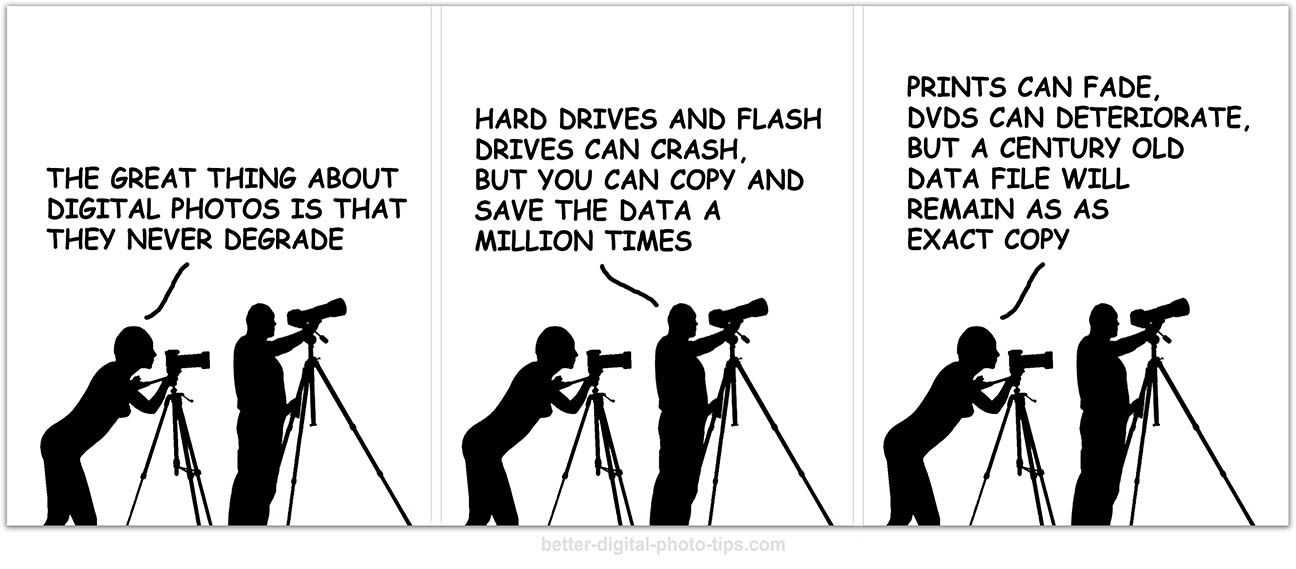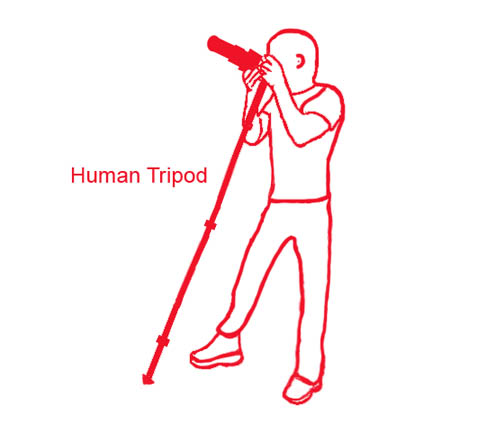HOW TO POSTS: LIGHTING AND COMPOSITION
Do digital photos degrade over time
Should you worry about your precious photos degrading over time. Yes and no. The digital data, by itself won't degrade over time. But, like photographic prints or old negatives can, the physical medium that you use to store your photos could fail. Additional, in the long term, the technology can change so much that it can be challenging to retrieve old photos.
Digital photos do not degrade over time. The prints that are made from the digital files can degrade over time. Various storage media, like CDs, DVDs, and Blu-Ray discs, where you save your digital photos, can deteriorate too and hard drives with digital photos stored on them can crash.
Additionally, flash memory drives won't degrade your digital photo files with time, but the drives can deteriorate with repeated delete and write cycles.
Old CDs, DVDs, and Blu-Ray disks will deteriorate over time. Computer hard drives and flash drives can become corrupted and crash. The older storage systems that were used in the 1990s, were tape drives, zip drives, and jaz drives are long gone. Old systems like these eventually become incompatible with modern storage systems.
how do photos lose quality over time
When they're saved photos are usually saved in a format known as a jpg such as your-photo.jpg. It'a popular format because it compresses the information into a smaller file size. This benefits you by not filling up so much of your memory storage.
The problem is that whenever a file is adjusted or edited in any way, each time it's saved as a compressed file. The quality will be reduced. Each time it's done is another generation away from the original, highest quality image file. See the example below of image quality loss.
 Photos that are edited and saved as jpg images lose quality with each generation.
Photos that are edited and saved as jpg images lose quality with each generation.Time, all by itself, does not automatically cause a deterioration in image quality. Repeated savings of edited images or saving at lesser image quality settings can have a harmful effect on photo quality.
Photography file FORMATS that don't lose quality
For advanced photographers who use Photoshop, there are options to save a photos in non-compressing formats that don't reduce quality, even after editing. These include TIFF and PSD files, which are much much bigger in file size. There's also the option to use the "universal" DNG (Digital Negative) format, but that's a topic for another day.
DO DIGITAL PHOTOS DEGRADE OVER TIME on a computer?
Photos will not inherently degrade on your computer over time. The biggest risk to losing your photos comes if the hardware is damaged, corrupted or completely crashes. Online photos are essentially stored on computers, called servers, and don't degrade unless there is a complete crash of the system and networked computers are all affected.
All reliable photo backup service providers have multiple backups and safeguards built into their systems.
how to preserve your digital photos for the long term
The good news is that you only have to stay somewhat current with your storage options of your photographs. If you are backing up locally-using your own disks-you will want to refresh your system and update to a relatively current technology every so often.
Because the market for photo storage and other data is so big, there's plenty of demand and that will insure that your online options will be plentiful. Here's my complete post on how to make your photos last longer.
parting thoughts on WHETHER digital photos degrade over time.
Just the act of opening a digital photo file will not degrade its quality. Just the passing of time alone will not affect the quality of a photo either. It's when a change is made to a photo and saved as a jpg file that you need to pay attention to quality issues.
I'll also suggest for you to visit one of the topics below to gain a better understanding your options for preserving your photos with a photo backup system that makes sense for you.
Stay inspired and keep shooting.


ABOUT BRUCE LOVELACE
Bruce is the publisher of this website. He is the author of the book "Improve Your Photography Instantly." Read more on Bruce on his Bio Page. He's been known as The Traveling Photographer ever since 1994. Read more about this website.
View some of Bruce's photos on Instagram. Visit the Facebook Page. Watch him on YouTube. Bruce runs photo workshops for kids and adults, and provides one-on-one photography coaching.
Digital Photography Education Location on Google My Business










